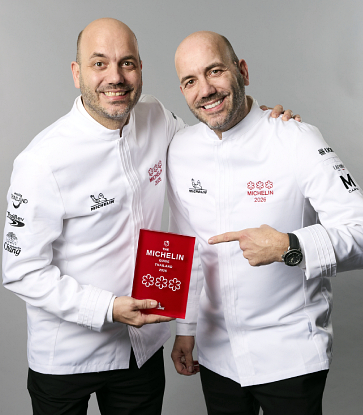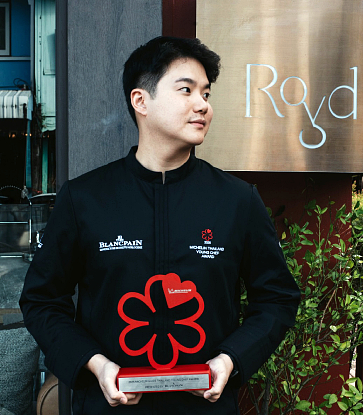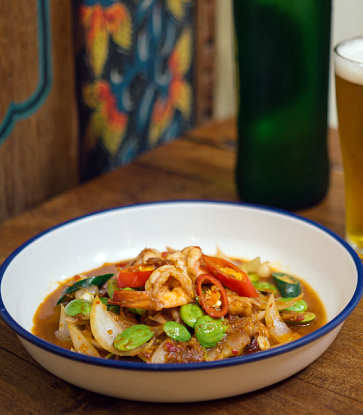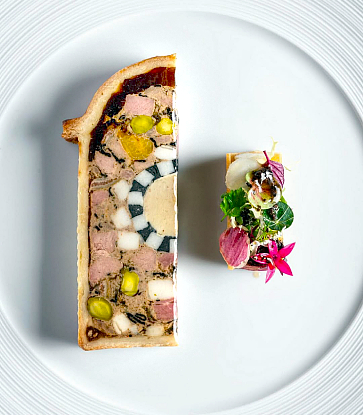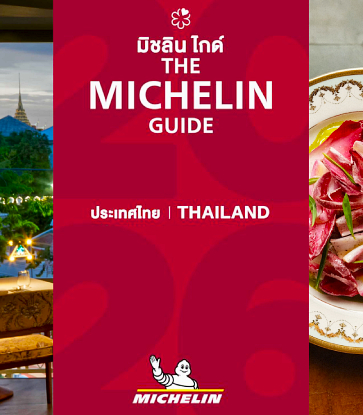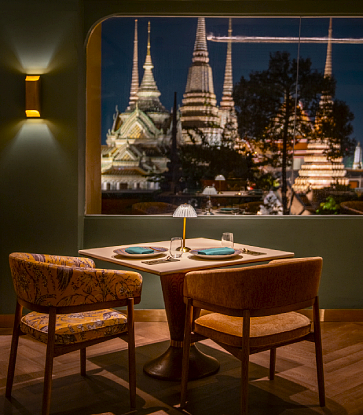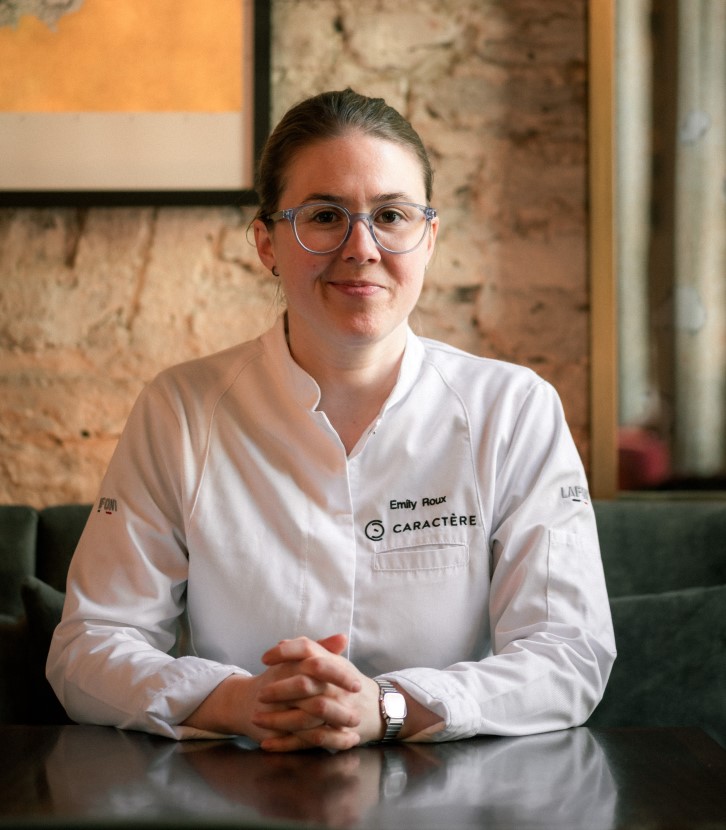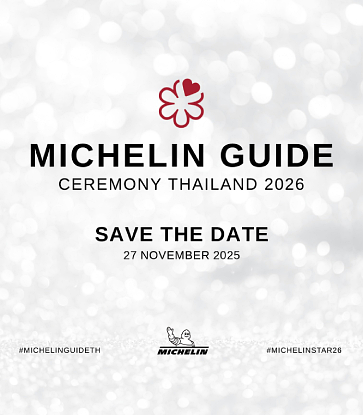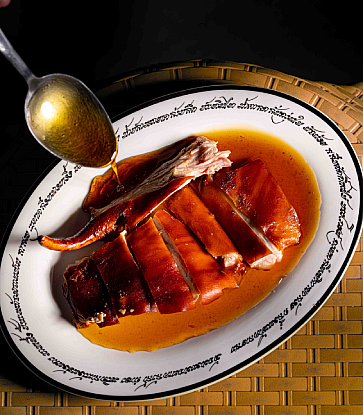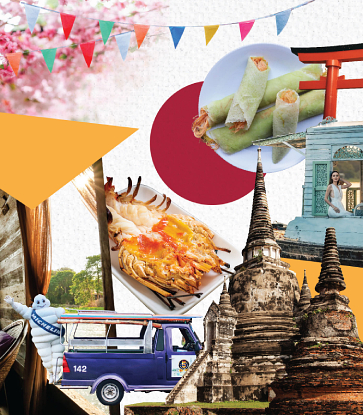What was the inspiration behind Le Du?
Le Du or “rue du” to be more accurate, actually means “season” in Thai and the name represents what we want to do at the restaurant, which is using seasonal produce from Thailand. We use 100% local produce here. Nothing is imported.
How would you describe your type of cuisine?
I’d describe us as modern Thai cuisine. We’re focused on Thai food and incorporating some modern, European techniques to create new, innovative Thai dishes.
Tell us about your training and background before opening Le Du and getting a MICHELIN Star?
I went to culinary school at CIA, The Culinary Institute of America, in New York. After that, I worked at Eleven Madison Park and The Modern in New York as well as Jean Georges. I opened Le Du as soon as I came back to Thailand. My second restaurant, called Baan (Bib Gourmand), is more casual. I want to cook what we eat at home, so it’s all food based on my family recipes.

Where did you get your passion for cooking?
No one in my family has a professional background in the culinary field but my family loves to eat and cook. As kids, my grandparents would cook for my two brothers and myself. Every evening after school, there would be a feast waiting for us back home so I’m certain that was how I personally developed a passion for eating and cooking.
When did you realise you wanted to become a chef?
I graduated in economics, but I realised I wanted to become a chef after I graduated. I started working at a bank for a month, and I knew straight away it wasn’t for me. I quit my job at the bank and went to New York to follow my dreams at the age of 22.
Tell us about your connection with northern Thailand, especially Chiang Mai.
I’ve always loved Thailand’s north, especially Chiang Mai. I’ve so many good friends and met so many good suppliers there, so it has a special place in my heart. I’ve been travelling to Chiang Mai 3-4 times a year for the past five years since opening Le Du and the city never fails to inspire me. With each visit, I always discover some new ingredients that I and a lot of Thais have never even heard of. The northerners have their own unique cuisine, culture and traditions so there are so many things to discover.
What does the word ‘Lanna’ mean to you?
Lanna is the name of the old kingdom before Thailand became one country. It’s one big kingdom in the north of Thailand with so much history, so many cultures, not to mention a food culture as well. In my mind, Lanna is something very beautiful and spiritual.
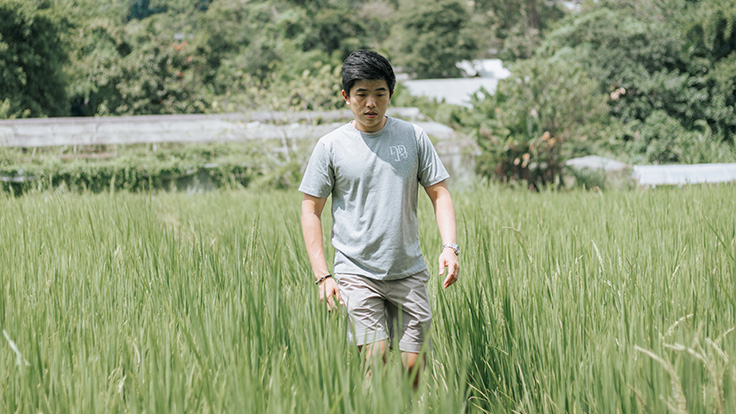
What are you cooking at the gala and why?
I’m cooking pork jowl because I want to recreate my first impression of Chiang Mai when I first visited many years ago. When you travel by car, you’d see small shacks set up along the streets. Some vendors would be grilling meat or whatever meat that’s wrapped in banana leaves to eat with sticky rice. That’s this “first love” sensation I want to give to people at the gala dinner this year, so I’ll be making grilled pork jowl then also work with some young jackfruit, something that’s very commonly found and eaten with almost every meal up north. I’ll cook it, then make it into a kind of northern-style salad with herbs from the north. We’ll mix it with fermented crab paste called Nam Pu. It’s almost like an ancient seasoning from the north of Thailand.
Can you talk about fermented crab and how you’ll be preparing it and why did you choose to source it from Pong Yaeng?
Pong Yaeng is about an hour away from the city centre of Chiang Mai. It’s a special place because it’s a town that can grow lots of vegetables and where farmers have been growing rice for hundreds of years. When there’s rice, that’s where you’ll find field crabs which we use to make fermented crab paste with. This is what they’ve been doing for hundreds of years before the fish sauce was invented. 300 years ago, no one in the north used fish sauce as it’s something that was only available in the south. What they actually used for seasoning were fermented crab paste, but this could only be done for three months of each year. They keep it for the whole year to use it as seasoning, without shrimp paste and fish sauce.

How important was the sourcing process for you when you first opened Le Du? How did you find the right supplier/s?
Six years ago, when I first opened Le Du, I discovered that the most difficult part about running a restaurant wasn’t the cooking part, but the sourcing of Thai ingredients. Back then, no one actually cared about local produce. I’m one of the first chefs who tried to encourage people to use local ingredients. We try to approach the farmers, fishermen and foragers to give us the best local produce possible. I travel to many different parts of Thailand to see what I need. Let’s say if I visit the north, I’d get fermented crab paste. When down south, I’d have to search for small fishermen who would find me fresh fish, and, of course, catch them sustainably and not destroy our ocean. For me it’s not all about good food, but also about the wellbeing of Thai farmers, fishermen, and our planet.
Will you be using special cooking techniques for the dish at the gala?
The pork jowl is the signature dish at Le Du. We cook it for a very long time and we also apply some European techniques when preparing it. We actually brine it first before slow-cooking it (sous-vide) at a very low temperature overnight. We then smoke it and finish it off on the grill before serving. For the crab, we will make it into a concentrated sauce or dressing. What we will try to do is to extract the flavours of the local ingredients and show their best side. Some people don’t like the fermented crab paste because of the overpowering smell, but for me, I believe that any ingredient, if you know how to bring the best out of it, it can taste amazing. As a chef, especially as a Thai chef, it’s our job to know our heritage and translate it into something edible so that the world can appreciate Thai cuisine and savour our local produce.

What does sustainability mean to you?
Sustainability is everything to me when I cook. Of course, it’s good for the planet, for the ocean, for the land, but I think it goes way beyond that. It’s also about fairness. It’s common sense that when you cook, you should take all this into account. It’s about what we leave behind on our planet for future generations to deal with. You have to think about the welfare of the farmers and wellness of the fishermen you are dealing with. How much do they get paid? How do they live? How do they treat their animals and products? I think every chef and every customer needs to take this into account when they cook or when they eat.
At the event, we’ll be using a food waste prevention process. How do you manage to avoid wasting food at Le Du and Baan?
When we create a menu, we try to see how we can use every part of the ingredients that we buy. Let’s say we get one big seabass from the south. Of course, we will use the fillet, maybe pickle it and serve it as a cold dish. Then we will make stock out of the rest of it – the bone, the tail, etc. We keep the head for ourselves so that our staff can enjoy it together. This is not the time where we can cut the nice parts from vegetables and throw everything else away. I think chefs need to consider what they throw away in the garbage every day now more than ever. At Le Du, we will use kale leaves for cooking but we will puree the stems, make it into oil or let our staff enjoy it. That’s what we try to manage when we design our menu.

What’s your favourite northern Thai dish?
It’s really an acquired taste but it’s fresh buffalo tartare which is a mixture of fresh buffalo meat and blood seasoned with local herbs and spices, and a little bit of bitterness from the buffalo’s stomach. It’s a dish that’s typical of the north and is one of my favourite, but it’s a difficult dish to enjoy and may not be a crowd-pleaser.
What’s so special and unique about northern Thai food? How would you compare it to food from other Thai regions?
Northern Thai food is something very unique because there is so much freshness in it. Southern and northeastern food are known for the spiciness but for me northern cuisine is probably the closest to nature because of its geographical location. There are so many forests here so there are many ingredients that can be foraged by locals year-round. As the ingredients are so different, the taste is different too. Here you will not find food super sour like in Isaan or super fishy like in the south. You will find the flavours so balanced, so velvet.
What’s your favourite restaurant in Chiang Mai?
The first one is Magnolia Café. In my opinion, it’s the best restaurant in Chiang Mai. I think they serve the best hang le here and they also have good traditional Thai dishes. The second one is Charoen Suan Aek. You can find super local and traditional northern dishes here. If you go, you won’t even know what is actually on the menu, even if you are Thai. When you read the menu, you won’t understand it at all as they only serve authentic northern dishes that aren’t available in Bangkok. The third one is Larb Di Khom Kon Yong which is in the city centre. This is where I go for my favourite buffalo tartare. The grilled pig ears and chin are also good. Actually, everything’s good here. It’s one of the best grilled meat shops in Chiang Mai.

What are some global trends you see happening in Bangkok or in the dining scene in Thailand in general?
I think the biggest trend now is that all the chefs are turning more to local produce which is what we want to see. Now, you see more and more Thai chefs and even some French or Italian chefs trying to use local ingredients in their cuisine. Six years ago, this would be something people would laugh at. “They’re low quality ingredients” they’d say. That’s not the case anymore. Now, we see local ingredients with much higher quality than ever before and, in some cases, even better than imported goods.
Has the arrival of the MICHELIN Guide changed Thailand’s dining scene at all?
The arrival of Michelin Guide has had a huge impact on the dining scene. When chefs see that the restaurants that use local produce, including myself, can achieve a MICHELIN Star, a Plate or Bib Gourmand distinction, they see that it’s actually possible to be recognised by using local ingredients. Before this, the attitude was “Oh, we have to cook only French, Italian or European food to be considered as a chef”. When the younger generation of chefs see that local produce can win awards, more and more young Thai chefs will want to cook Thai food. For me, that’s the impact that the MICHELIN Guide has had on Thailand.

What’s the most satisfying part about what you do?
I’m happiest when I see my customers at Le Du and Baan enjoying my food and actually telling me that they learned about some Thai ingredients they never knew existed. When they realize how full of natural resources and amazing our country is, I consider that an achievement.
As a successful chef, do you have any advice for young chefs who are just starting out on their career?
You have to cook something you really believe in. When I started Le Du, I told people I’d cook modern Thai food using only local ingredients and people laughed at me. People told me I’d fail. The restaurant would close in six months or one year. Don’t listen to the naysayers. Believe in what’s inside you. If you know what’s best for you, for your country, just do it. Now, six years have passed and I have a MICHELIN Star. That’s not so bad!



